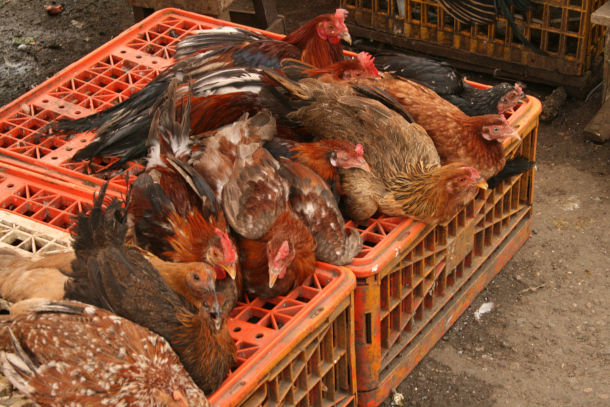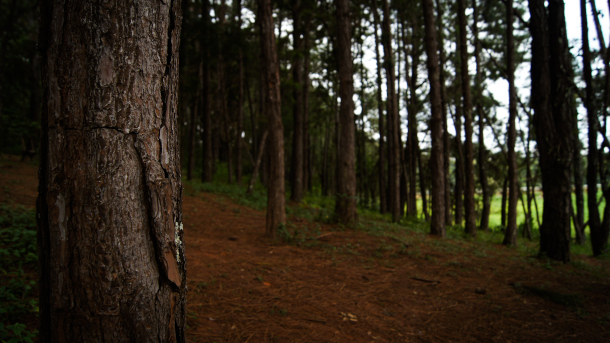Beyond the Headlines
Air Date: Week of February 24, 2023

Ukraine is demanding that Russia pay for environmental war crimes. (Photo: Oleksandr Ratushniak. Flickr, CC BY-ND 2.0)
Journalist Peter Dykstra joins Host Bobby Bascomb this week to discuss the billions of dollars in damage to Ukraine’s environment since the Russian invasion. They also discuss the ongoing bird flu outbreak in which some 60 million chickens and turkeys have been slaughtered on hundreds of commercial farms in the U.S. For a history lesson, they dive into the 1799 Federal Timber Forestry Purchases Act, which was likely the first forest conservation measure in the U.S.
Transcript
BASCOMB: It's time to take a trip now beyond the headlines with Living on Earth commentator, Peter Dykstra. Hey there, Peter, what do you have for us this week?
DYKSTRA: Hi, Bobby. It's the first anniversary of Russia's invasion of Ukraine and the Ukrainian Environment Minister Ruslan Strilets says that environmental damages to Ukraine as inflicted by Russia amount to an estimated $48 billion in pollution, contamination of land and water, health related problems, and so many other things that have gone into the ruthless bombardment of Ukraine.
BASCOMB: Yeah, we did a story a while back about cetaceans, dolphins and porpoises washing up dead in the Black Sea as a result of the war. You know, it's hard to talk about the environment when thousands of people have also died. But as you're telling us, you know, pollution in the form of water and air is going to affect those people for a long time.
DYKSTRA: As you mentioned the cetacean deaths are one more side of this, who knows how many other aspects of this will be recovered after this war ends, if it ends.
BASCOMB: Well, what else do you have for us this week?
DYKSTRA: Another billions of dollars in price tag in bird flu, avian flu here in this country, there's a second year it's kind of rare that avian flu outbreaks go into two years affecting everything from a government cost compensating farmers now believed to be somewhere about two thirds of a billion dollars to the farmers costs that aren't compensated to food wholesalers and retailers, grocery stores. And of course, you may have noticed what it costs when the consumer buys chicken or turkey or eggs.

The bird flu outbreak has cost the government roughly $661 million and added to consumers' pain at the grocery store. (Photo: Laughlin Elkind, Flickr, CC BY 2.0)
BASCOMB: Yeah, I think eggs are up to about a $5 a dozen now. It's you know, hitting everybody. But as far as I understand it, there's only been one confirmed case of human bird flu, which wasn't even very serious. So there's that silver lining.
DYKSTRA: But there's concern that some day it may spread to humans. There's already evidence that it has spread beyond the bird population to other mammals ranging from bears and marine mammals like whales and seals. And of course, non food birds like eagles have also been said to literally be falling from the sky, not in huge amounts, but in amounts that cause concern for the spread of avian flu beyond chickens and turkeys, possibly someday to humans.
BASCOMB: Well, what do you see for us from the history books this week?
DYKSTRA: This one goes way back to the very end of the 18th century, February 25 1799, a law called the Federal timber purchases act, one of the first conservation laws enacted by this new country, the United States. Brought in mainly to protect forests in the south where Live Oak, our common tree, those oak trees were prized, mostly in shipbuilding, and Congress wanted to protect those forests and wild lands. And what has happened since then, is that the law was strengthened to cover more forests in 1817. All of this eventually evolved a century later into the US Forest Service, which now has national forests from coast to coast.

Created in 1799, the Federal Timber Forestry Purchases Act was the first forest conservation measure in U.S. history, appropriating $200,000 for buying key forest land. (Photo By João André O. Dias, Flickr, CC BY-ND 2.0)
BASCOMB: Well, so 1799 What happened to those forests when we switched from wooden boats to steel?
DYKSTRA: Well, when iron clad boats and military ships came about much later in the 19th century, we found so many other things, to consume timber for anything from paper to homes for a rapidly booming country. And we found plenty to do with our timber. And it became under greater and greater stress where there still is the old, tired, worn jobs versus environment issue being played out today in places like the Tongass National Forest and Alaska, and so many other forests throughout the Western US.
BASCOMB: All right. Well, thanks, Peter. Peter Dykstra as a commentator for living on Earth. We'll talk to you again real soon.
DYKSTRA: Okay, Bobby, thanks a lot, and I'll take to you soon.
BASCOMB: And there's more on the stories on the living on Earth website. That's loe dot org.
Links
CBC “Ukraine Wants to Make Russia Pay for Environmental Toll of War”
AP News “Bird Flu Costs Pile Up As Outbreak Enters Second Year”
Living on Earth wants to hear from you!
Living on Earth
62 Calef Highway, Suite 212
Lee, NH 03861
Telephone: 617-287-4121
E-mail: comments@loe.org
Newsletter [Click here]
Donate to Living on Earth!
Living on Earth is an independent media program and relies entirely on contributions from listeners and institutions supporting public service. Please donate now to preserve an independent environmental voice.
NewsletterLiving on Earth offers a weekly delivery of the show's rundown to your mailbox. Sign up for our newsletter today!
 Sailors For The Sea: Be the change you want to sea.
Sailors For The Sea: Be the change you want to sea.
 The Grantham Foundation for the Protection of the Environment: Committed to protecting and improving the health of the global environment.
The Grantham Foundation for the Protection of the Environment: Committed to protecting and improving the health of the global environment.
 Contribute to Living on Earth and receive, as our gift to you, an archival print of one of Mark Seth Lender's extraordinary wildlife photographs. Follow the link to see Mark's current collection of photographs.
Contribute to Living on Earth and receive, as our gift to you, an archival print of one of Mark Seth Lender's extraordinary wildlife photographs. Follow the link to see Mark's current collection of photographs.
 Buy a signed copy of Mark Seth Lender's book Smeagull the Seagull & support Living on Earth
Buy a signed copy of Mark Seth Lender's book Smeagull the Seagull & support Living on Earth

